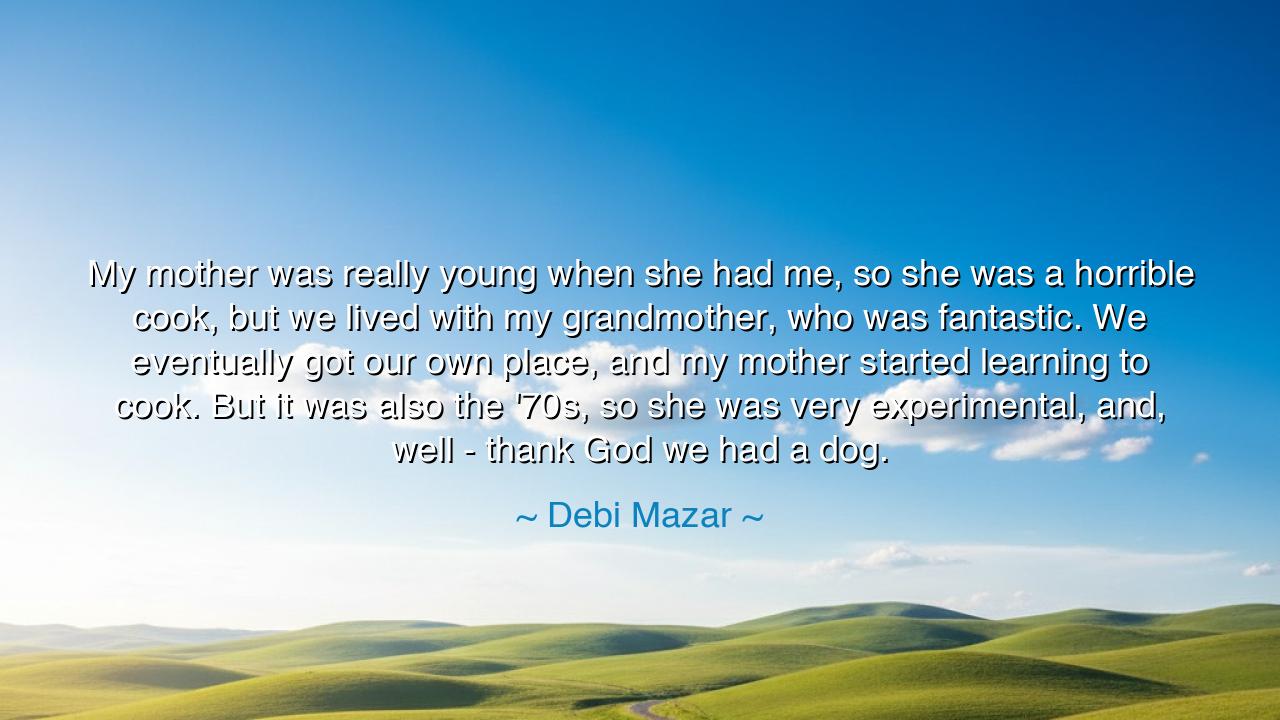
My mother was really young when she had me, so she was a horrible
My mother was really young when she had me, so she was a horrible cook, but we lived with my grandmother, who was fantastic. We eventually got our own place, and my mother started learning to cook. But it was also the '70s, so she was very experimental, and, well - thank God we had a dog.






In the warm and humorous recollection of Debi Mazar, there lies a truth both gentle and profound: “My mother was really young when she had me, so she was a horrible cook, but we lived with my grandmother, who was fantastic. We eventually got our own place, and my mother started learning to cook. But it was also the '70s, so she was very experimental, and, well — thank God we had a dog.” On the surface, it is a tale of family and food, touched with laughter. Yet beneath it glows the deeper story of growth, generations, and the sometimes chaotic beauty of learning through life itself.
Mazar’s words capture the tender imperfection of family — that sacred place where love grows in the midst of trial and error. Her mother, young and untested, symbolizes the courage of those who step into responsibility before they are ready. The grandmother, wise and nurturing, represents the anchor of tradition — the keeper of recipes, rituals, and the gentle art of patience. And between them stands Mazar herself, the child who witnessed both the failures and the triumphs of those who raised her. Her quote, told with wit, reminds us that wisdom is not inherited whole; it is passed down, piece by piece, often through mistakes and laughter.
To live through such moments is to understand that even failure has its flavor. The young mother of Mazar’s story did not give up when her dishes burned or fell flat; she kept trying, experimenting, daring to learn in her own way. The 1970s, as Mazar notes, was an age of change and experimentation — not only in food but in thought and culture. The kitchen, like the world outside, was alive with new possibilities. Thus, her mother’s wild recipes were not failures, but acts of courage — proof that even in imperfection there is beauty, and in experimentation, the seeds of wisdom are sown.
The ancients would have seen in this tale a metaphor for all human growth. A young person, stepping into an unfamiliar role, guided by the old yet eager to find their own path — this is the story of civilization itself. From the first fire built by trembling hands to the first bread kneaded with uncertain skill, humanity has always learned by trying, erring, and trying again. Each generation carries the knowledge of the last, yet must also test its own ideas, its own recipes for life. Mazar’s humor conceals a great truth: progress is born from imperfection, and it is the willingness to fail — and to laugh at failure — that leads to mastery.
There is an echo of this same spirit in the story of Julia Child, the famed chef who once burned her way through countless recipes before becoming a legend of cuisine. She began her culinary journey late in life, untrained and uncertain, yet she embraced every mistake with delight. Like Mazar’s mother, she experimented fearlessly, blending joy with curiosity. “No one is born a great cook,” Julia once said, “one learns by doing.” And so too in life — no one is born wise, skilled, or complete. We learn, we stumble, and in stumbling, we grow.
In Debi Mazar’s quote, the dog — grateful recipient of her mother’s culinary missteps — stands as a symbol of grace. It reminds us that in life, as in the kitchen, our mistakes do not destroy us; they feed someone, somewhere, in ways we may not see. Every failed attempt nourishes understanding. Every burnt meal teaches patience. Every laugh shared around a ruined dish binds a family closer together. Such moments, though small, are the fabric of love — humble, human, and enduring.
So, my children of hearth and home, take this lesson to heart: do not fear failure in your learning. Be as Mazar’s mother was — brave enough to try, humble enough to laugh, and determined enough to keep going. Perfection is not the goal; connection is. The best things in life — skill, wisdom, love — are learned not through success alone, but through the willingness to keep stirring the pot, even when the recipe goes wrong.
Thus, let Debi Mazar’s words echo through the chambers of your own experience: “My mother started learning to cook… she was very experimental, and, well — thank God we had a dog.” Let it remind you that the road to mastery is paved with laughter, with burnt edges and unexpected sweetness. For it is through imperfection that the heart learns its deepest lessons — and through persistence that the ordinary becomes extraordinary.






AAdministratorAdministrator
Welcome, honored guests. Please leave a comment, we will respond soon